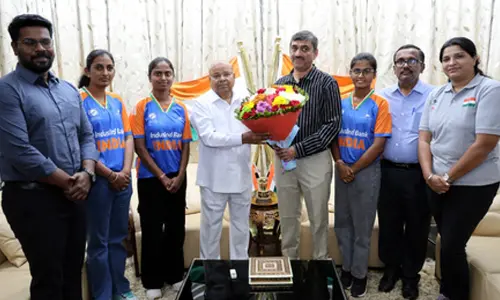Political reservations for women: Why and how

It is rather surprising that in the parliamentary history of India, women’s reservation bill is the only bill that failed to become an act despite a clear parliamentary majority for it. The flimsy reasons given by the successive governments reveal lack of political will. The governments have been arguing that this bill could not be enacted due to lack of political consensus.
It is rather surprising that in the parliamentary history of India, women’s reservation bill is the only bill that failed to become an act despite a clear parliamentary majority for it. The flimsy reasons given by the successive governments reveal lack of political will. The governments have been arguing that this bill could not be enacted due to lack of political consensus. Nowhere it is written in the Constitution or in the law that a bill can be enacted only if there is a political consensus. In fact, many Acts were made despite strongest opposition to them in parliament.
The patriarchal political value system is the only hindrance in achieving political empowerment of women. Let’s first look at the major arguments against the bill. What difference does it make if more number of women are in parliament or state legislatures? Will it alter the nature of governance? First, democracy is the most representative form of political organization the human civilization has heralded so far.
There is no meaning of democracy when women who constitute nearly half of the population, have only eight per cent representation. According to the UNDP Human Development Report, India ranks very low. Women suffer more than men due to lack of education, health, hygiene, sanitation, drinking water, nutrition etc. As a result, women are generally more concerned about these issues. Greater representation for women shall ensure a shift in the focus of development agenda towards human development and social development.

It is said that women’s reservation will help those coming from influential political families. It is true that influential people would utilise these reservations at the beginning. But in due course political leadership will emerge. This is also the experience with Scheduled Caste and Scheduled Tribe reservations. At the initial stage, landlords fielded their henchmen and enjoyed power by proxy. But things changed substantially over a period of time.
If we closely look at the Indian politics, we would notice two discernible trends. First, women who have entered politics might have used their family background at the beginning. But during the course of their political career they emerged as political leaders on their own. Indira Gandhi was a shining example of such a trend. In fact, there are women political leaders who have grown in their political career without any influential family background.
Uma Bharati, Mamata Banerjee are examples of such a trend. Therefore it is wrong to oppose women’s reservations on the ground that it will lead to deedhi, beebhi, bethi syndrome (sister, wife or daughters of influential political leaders getting benefited by these reservations).
Some political parties like Rashtriya Janata Dal (RJD), Samajwadi Party, etc are opposing the bill in its present form that it would benefit upper caste women. As a result, the composition of BCs and minorities would be adversely affected. Such a possibility cannot be ruled out. However, opposing on this ground is uncalled for. No law is final. Every law is evolved over a period of time. Women as social category suffer discrimination cutting across caste, class, religion in our society.
We can begin with women’s reservations and in case the experience reveals that upper caste women are getting disproportionately higher share, the law can be suitably amended. In fact, the OBCs constitute nearly one fourth of Indian parliament. In view of these objections, several alternate measures are being suggested. The most important among them is to amend the Proportional Representation Act to mandate every political party to field women in at least one third of the constituencies.
This seems to be an intelligent solution. But a closer scrutiny of the proposal reveals its true character. If this proposal is implemented as an alternative, political parties driven by patriarchal values, would field women in the constituencies they know they would lose in all probability.
But an amendment is suggested to prevent such a misuse. According to this amendment, every political party has to field women in at least in one third of seats in every state in parliamentary elections. Similarly, every political party has to field women candidates in at least one third of seats in every district in case of assembly elections.
But, this amendment is not a complete solution to the possibility of misuse. Every political party can easily identify weaker seats and field women in those seats. It is in fact difficult to implement such a proposal in the era of coalitions, as all political parties do not contest all the seats.
Yet another alternative being suggested is that there shall be dual membership in one third of seats. Apart from a general member, in these one third seats, there will be a women member too. But this is not political empowerment of women as women’s status will be mere titular in nature. The real power would be wielded by the general member only.Some of the other alternative proposals are as follows:
There may not be any arithmetical sanctity for the demand, but reserving one third of seats would mean a substantial increase from the present level of representation and shall be relatively proportionate to the women’s share in the population. Any attempt to dilute this proportion is absolutely undemocratic.
The other proposals are also equally undemocratic. For instance, yet another proposal is to keep the present strength untouched and create one third supernumerary seats and reserve them for women. But anyone who knows arithmetic would understand that this would not be one third. But it will be much less than that.
In fact all such alternatives are a result of lack of political will on the part of our political party system as a whole. The often quoted argument for not fielding sufficient number of women candidates is the winnability factor. This argument lacks conviction given the fact that women constitute a meager percent of Rajyasabha and Legislative Councils’ seats. The low level of women’s representation in the Rajyasabha provides an ample reflection of abysmal lack of commitment of our political system to the goal of political empowerment of women.
Therefore, the only alternative is to implement the commitment to enact women’s reservation bill. The act can be amended accordingly based on the experience. In several countries of the world including that of advanced nations too, women have to struggle to get even voting right. But in India women got the right to vote as democratic India granted universal adult franchise with the dawn of independence itself. Let the Indian democracy create history once again by providing women the constitutional guarantee to adequate political representation.
By:Prof K Nageshwar














